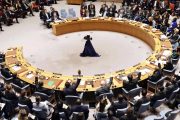
The U.S. government on December 12 “mistakenly” murdered 15 people attending a wedding in Yemen.
Citing “local security authorities,” Reuters reports that the families celebrating the wedding “were killed in an air strike after their party was mistaken for an al-Qaida convoy.”
Another unnamed official told Reuters that 10 people were killed immediately by the missiles, while five died later of injuries they sustained in the attack. Five more members of the wedding party were wounded, but survived the strike.
Although the United States certainly would not confirm the story, witnesses report that the missiles were fired from a drone.
On Monday, a similar strike executed by a U.S. drone killed at least three people traveling in a car in Yemen. The remotely controlled aircraft launched several missiles at a vehicle as it passed through the Al Qutn area of Hadramout. LongWarJournal cites a Yemeni intelligence official who claimed that it was impossible to identify the victims of the attack as the bodies were “burned beyond recognition.”
While the people at the wedding were accidentally killed by the United States, the trio assassinated in Monday’s strike were “suspected militants” associated with al-Qaeda in the Arab Peninsula (AQAP), according to stories reporting on the airstrike.
For President Obama and those pulling the triggers on the joysticks guiding the missiles toward their human targets, “suspected militants” are officially defined as “all military-age males in a strike zone.”
For those of us concerned with the Constitution, due process, and the rule of law, however, “suspected militant” is just a euphemism for a person not charged with any crime, not afforded even the most perfunctory due process protections, but executed by presidential decree anyway. In this way, we are no better than those we kill in the name of safety.
The drone war began in Yemen in 2002. There have reportedly been 84 such strikes since that year. The number of dead is not verifiable, but LongWarJournal reports that 395 “al-Qaeda commanders” and 99 “civilians” have been killed during the duration of the program.
Regardless of the body count, however, Americans can expect the growth of anti-American sentiment to increase proportionally to the number of missiles fired from the powerful Predator and Reaper drones used to carry out the culling of the president’s kill list.
That sentiment is already being channeled by al-Qaeda leadership as its primary recruitment message.
Testimony from victims and eyewitnesses of the drone-delivered devastation in Yemen reveals that the attacks are serving better to recruit al-Qaeda than defeat them.
Since the inauguration of Yemeni President Abed Rabbo Mansour Hadi, the number of sorties sent to Yemen has spiked.
Although U.S. officials typically do not comment on this or any other drone strike in Yemen or elsewhere, Hadi isn’t quite so close-mouthed about the arrangement between the two “allies.”
In a statement made to the Washington Post in an interview published September 29, 2012, President Hadi said he “personally approves every U.S. drone strike in his country.”
Hadi’s praise for the Predators continued during a speech delivered at the Woodrow Wilson International Center for Scholars. “They [drones] pinpoint the target and have zero margin of error, if you know what target you’re aiming at,” Hadi said, according to the New York Times.
As the Washington Post rightly posits, it is likely this personal interest in promoting President Obama’s drone war that has influenced U.S. officials to consider Hadi “one of the United States’ staunchest counterterrorism allies.”
Beyond the effect the winnowing of the president’s kill list is having on domestic politics in Yemen, there is a larger threat to security from blowback.
Blowback in this case is defined as violent counter-attacks carried out as revenge for covert operations.
After a drone attack killed 13 Yemenis by “mistake” in September 2012, relatives of those killed in the strike spoke with the clarity and carelessness that comes from the mixture of mourning and rage.
“You want us to stay quiet while our wives and brothers are being killed for no reason. This attack is the real terrorism,” said Mansoor al-Maweri, whom CNN reported as being “near the scene of the strike.”
Then there was this from “an activist” who lives near the site of the September massacre:
“I would not be surprised if a hundred tribesmen joined the lines of al Qaeda as a result of the latest drone mistake,” said Nasr Abdullah. “This part of Yemen takes revenge very seriously.”
One struggles to imagine anything more likely to convince young Yemenis that the United States is not their ally, but rather their enemy, a far away menace that routinely murders innocent men, women, and children. As reported by the U.K.’s Guardian on December 12:
Farea al-Muslimi, a Yemeni activist who testified to the US Senate about the impact of the drone strikes earlier this year predicted the strike would drain Yemeni citizens’ outrage over the recent attack on the defense ministry by al-Qaida in the Arabian Peninsula that killed more than 50 people.
“The strike today literally saved AQAP’s image and shorted by months the PR work [they] would have needed to do,” al-Muslimi said. “Nothing could have made Yemenis forget the horrible images of the attack in Sanaa more than the images of this current drone strike that targeted a wedding party.”
Perhaps Americans shouldn’t worry about blowback, about the recruitment of battalions of new “militants.” There are some who argue that the goal of the drone war is not to reduce AQAP’s strength, but to increase the safety of the United States.
The problem with that premise is that there is no way to tell who is a “militant” and who isn’t.
More to the point, when did militancy become a crime? If it is a crime, where is it defined? How can anyone know if he is guilty of militancy if such a crime is not defined? Could one hypothetically be a militant without knowing it, given that the crime is nowhere defined?
Incidentally, it is this very vagueness that dilates the grey area and makes the National Defense Authorization Act (NDAA) such a fearsome weapon in the arsenal of the seemingly all-powerful president.
President Obama’s nearly daily approval of drone-delivered assassinations is an effrontery to over 650 years of our Anglo-American law’s protection from autocratic decrees of death without due process of law. When any president usurps the power to create a kill list, add names to that kill list, keep that kill list secret, and assassinate people on that kill list, he places our Republic on a trajectory toward tyranny and unbounded, unaccountable, unending government-sponsored terrorism.
Of course, it would be another matter if those targeted and executed by the president were armed enemy combatants. They were not. Were these suspected “militants” enemy soldiers captured during wartime they would be necessarily afforded certain rights granted to POWs.
Those slated for assassination are not allowed any rights — neither the due process rights given to those accused of crimes nor the rights of fair treatment given to enemies captured on the battlefield.
The White House has assumed all power over life and death — at home and abroad — and has created a brand-new category of individual — one who can be indiscriminately deprived of all rights altogether.
Joe A. Wolverton, II, J.D. is a correspondent for The New American and travels frequently nationwide speaking on topics of nullification, the NDAA, and the surveillance state. He is the host of The New American Review radio show that is simulcast on YouTube every Monday. Follow him on Twitter @TNAJoeWolverton and he can be reached at [email protected]



